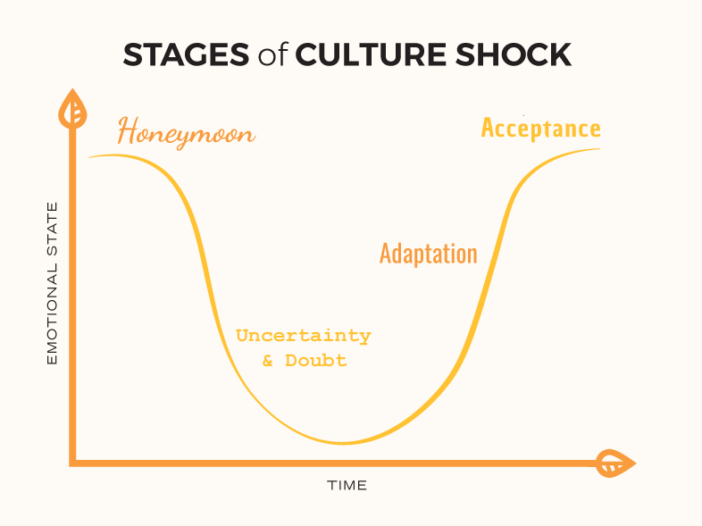
How to Work Through the Culture Shock of Physical Isolation
We’ve found ourselves in the midst of a global pandemic, news stories and Facebook posts swirling through our society about a novel virus that’s quickly taken the world by storm. And despite the chorus of “we’re in this together” from businesses, bosses, and teachers alike — we can’t help but feel a little alone experiencing “culture shock” of isolation.
All of a sudden, we are shuttered up in our houses. The only trips we make outside are to grocery stores or for short neighborhood walks — and even then, we must keep our distance for fear of catching or spreading the novel coronavirus. In a world that was already feeling the bruises of struggling social connection, we’re more isolated than ever before. Let’s take a look at the culture shock of physical isolation and how we can work through it.
What does “culture shock” look like?
Anthropology and psychology experts generally accept a few main “stages” of culture shock. It’s important to realize that the process isn’t strictly linear, though — everyone experiences life changes differently.
Honeymoon
Humans are impressively resilient. In many cases, one of our first reactions after being thrust into a new culture is to see how amazing it is. We naturally spend a short period of time focused on the initial positives of our new situation.
You might find yourself thinking things like:
- I get to learn from home and wear my sweatpants whenever I want!
- No more walking to class in the rain or snow. Phew!
- I’m going to save money on gas and eating out.
- I don’t need to make up excuses not to go out with my friends when I feel too tired!
- I’m excited about more time with my parents, pets, and childhood home.
- This sort of feels like a “vacation”. It’s a little fun.
Uncertainty and doubt
Unfortunately, the honeymoon phase is typically as short as it is sweet. As more information about COVID-19 and its severity becomes available — and as we start to realize our new normal isn’t just a temporary vacation from real life — we begin feeling a slew of unsavory emotions.
This stage is where uncertainty, doubt, anxiety, frustration, sadness, and even anger take root in our minds.
As a college student, you have a particularly unique struggle. Not only are you navigating a global pandemic — you’ve also had your semester unceremoniously interrupted and now need to manage your college course load remotely with little to no preparation. Add in new responsibilities at your parents’ or family members’ home throughout the quarantine, and it’s no surprise that things can be a bit overwhelming.
You might notice that you’re feeling:
- Constricted because you can’t do the things you want to do
- Lonely away from your college friends and advisors
- Doubtful that our country’s efforts will be successful in the long term
- Anxious that you, your family, or friends will become sick
- Frustrated with the tech issues of online learning
- Unsure that life will ever “go back to normal”
Adaptation and acceptance
Overcoming uncertainty and doubt aren’t easy — but thankfully, the lows of culture shock usually don’t last forever. As time goes on, we’re able to adjust to our new routines, process our mixed emotions, and ultimately reach a more relaxed mental state.
That’s not to say that things are suddenly easy. Adaptation is often a gradual process, and it might happen so subtly that you barely notice until you start looking back. But eventually, you’ll find that you’re able to:
- Accept that this is the reality of your new situation
- Understand that this, too, is temporary and will pass in time
- Make the most of the opportunities COVID-19 has created in your life
- Map out ways to be productive in your new remote studies
- Process your fears and worries about the virus
- Settle into routines and coping strategies that make you feel at peace
And when this does end, and we look around in wonder at the ability to venture further than the neighborhood again? We might experience a similar culture shock process in reverse. Sudden life changes are never smooth sailing — but remember just how adaptable we are.
It’s okay to grieve your lost experiences
An important part of moving into the acceptance stage of culture shock is giving yourself the space to feel, name, and process your emotions. You’ve just lost the promise of so many treasured experiences — and it’s okay to experience grief.
While uncomfortable, grief is also normal and healthy to acknowledge. It’s true that you have many things to be thankful for, but saying you can’t be sad because someone else has it worse is a lot like saying you can’t be happy because someone else has it better. Now, more than ever, it’s important to be kind to ourselves.
It’s okay to grieve the graduation ceremony you spent months looking forward to. It’s okay to grieve those final nights with friends that you never got to plan. It’s okay to grieve every single thing that makes your heart nearly burst when you think about it — and it’s okay to admit that your heart is even bursting in the first place.
At the end of the day, vulnerability is strength. Here are some ways to process your grief:
- Acknowledge your feelings, and accept them for what they are
- Understand that the grieving process is unique to each individual
- Start a journal to reflect on your experiences
- Share your feelings with friends, parents, or other trusted sources
- Remember that this is temporary
- Look forward to future plans
Reach out and find connection
As hard as it might be to imagine, human connection is still possible in times of physical isolation. We just need to be more intentional about reaching out and finding it. Here are some ideas:
- Set time aside each day to reach out to friends, especially those you didn’t see often before the novel coronavirus situation
- Enroll in a free online class on something you’ve always been interested in
- Harness the true power of social media to cross physical distance
- Set up a virtual group study session or conversation with your professor
- Explore ideas like remote movie watching parties, game nights, and more
- Know that Candid is here for you — reach out any time
And remember: it’s okay if you don’t always want to connect. Take time for yourself, and don’t worry if you need some space to process. We’re optimistic that this crisis will bring our society closer together as we lean into our existing support networks and build new ones — but it’s also a prime opportunity to look inward and recharge without the constant external demands of our previously fast-paced lives.
No one knows exactly how to work through our world’s reality right now. Your parents, teachers, and advisors are struggling with it too. Show them grace — and show yourself grace. Together, we can and will get through this.
Written by Haley Young
Content Specialist, The Digital Ring
